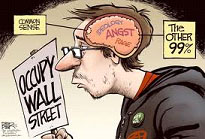|
|
《考研英语历年真题详解及复习指南》本书由新东方教育科技集团研发中心和考研项目推广中心联合推出,力求为考生提供一本内容翔实、讲解精准的备考指南。
同源泛读,能有效帮助考研的同学培养语感,建立良好的英语阅读环境,有助于考研英语阅读成绩的提高。
考研英语阅读精选:公司 人民 真相
『如果听任公司自行其是,它们将会给人类的价值观造成严重威胁。』
Corporations, People and Truth
October, 2011 | from The New York Times

The Occupy Wall Street protest movement has raised serious questions about the role of capitalist institutions, particularly corporations, in our society. Well before the first protester set foot in Zucotti Park, a heckler urged Mitt Romney to tax corporations rather than people. Romney’s response — “Corporations are people” — stirred a brief but intense controversy. Now thousands of demonstrators have in effect joined the heckler, denouncing corporations as “enemies of the people.”
Who’s right? Thinking pedantically, we can see ways in which Romney was literally correct; for example, corporations are nothing other than the people who own, run and work for them, and they are recognized as “persons” in some technical legal sense. But it is also obvious that corporations are not people in a full moral sense: they cannot, for example, fall in love, write poetry or be depressed.
Far more important than questions about what corporations are is the question of what attitude we should have toward them. Should we, as corporate public relations statements often suggest, think of them as friends (if we buy and are satisfied with their products) or as family (if we work for them)? Does it make sense to be loyal to a corporation as either a customer or as an employee? More generally, even granted that corporations are not fully persons in the way that individuals are, do they have some important moral standing in our society?
My answer to all these questions is no, because corporations have no core dedication to fundamental human values. Such corporations exist as instruments of profit for their shareholders. This does not mean that they are inevitably evil or that they do not make essential economic contributions to society. But it does mean that their moral and social value is entirely instrumental. There are ways we can use corporations as means to achieve fundamental human values, but corporations do not of themselves work for these values. In fact, left to themselves, they can be serious threats to human values that conflict with the goal of corporate profit.
Corporations are a particular threat to truth, a value essential in a democracy, which places a premium on the informed decisions of individual citizens. The corporate threat is most apparent in advertising, which explicitly aims at convincing us to prefer a product regardless of its actual merit.
But even more important is the role of corporations in debates over public policy. Here their immense financial resources give them a privileged position — especially through lobbying — to argue not for what they think is the truth but for what promises to promote their profits.
Their defining goal is to generate profit. Individuals running corporations may well be civic-minded and altruistic and may try to make company policies work for the public good. They may also be motivated by excellence — making a good product or providing a service useful to many people. But ultimately profit is king. The very nature of a corporation makes profits essential; those that lose money will not survive.
There are cases when telling the truth is the best means to advance corporate profits. In 1982, when seven people in Chicago died from poisoned Tylenol, Johnson & Johnson appealed to its credo, which makes concern for its customers a primary corporate goal, and told the entire truth about what had happened. This honesty turned a potential public-relations disaster into a triumph.
It’s not, however, unfair to ask what Johnson & Johnson — or any other company — would have done if there were a deceptive response that seemed likely to prove more profitable in the long run. Even Johnson & Johnson’s impressive corporate credo ends by saying, “Our final responsibility is to our stockholders” and “Business must make a solid profit.” The credo is unclear about what happens when there is a conflict between responsible action and long-term profit.
None of this means that corporations are evil or that socialism should replace the free-enterprise system. As Michel Foucault said of all power structures, it’s not that corporations are bad but that they are dangerous. The self-serving corporate speech that fills our media and halls of government is particularly dangerous for our democracy. At least for this reason, the Occupy Wall Street protesters are right to distrust corporations.(705 words)
文章地址:
http://opinionator.blogs.nytimes.com/2011/10/12/corporations-people-and-truth/?ref=opinion |
|